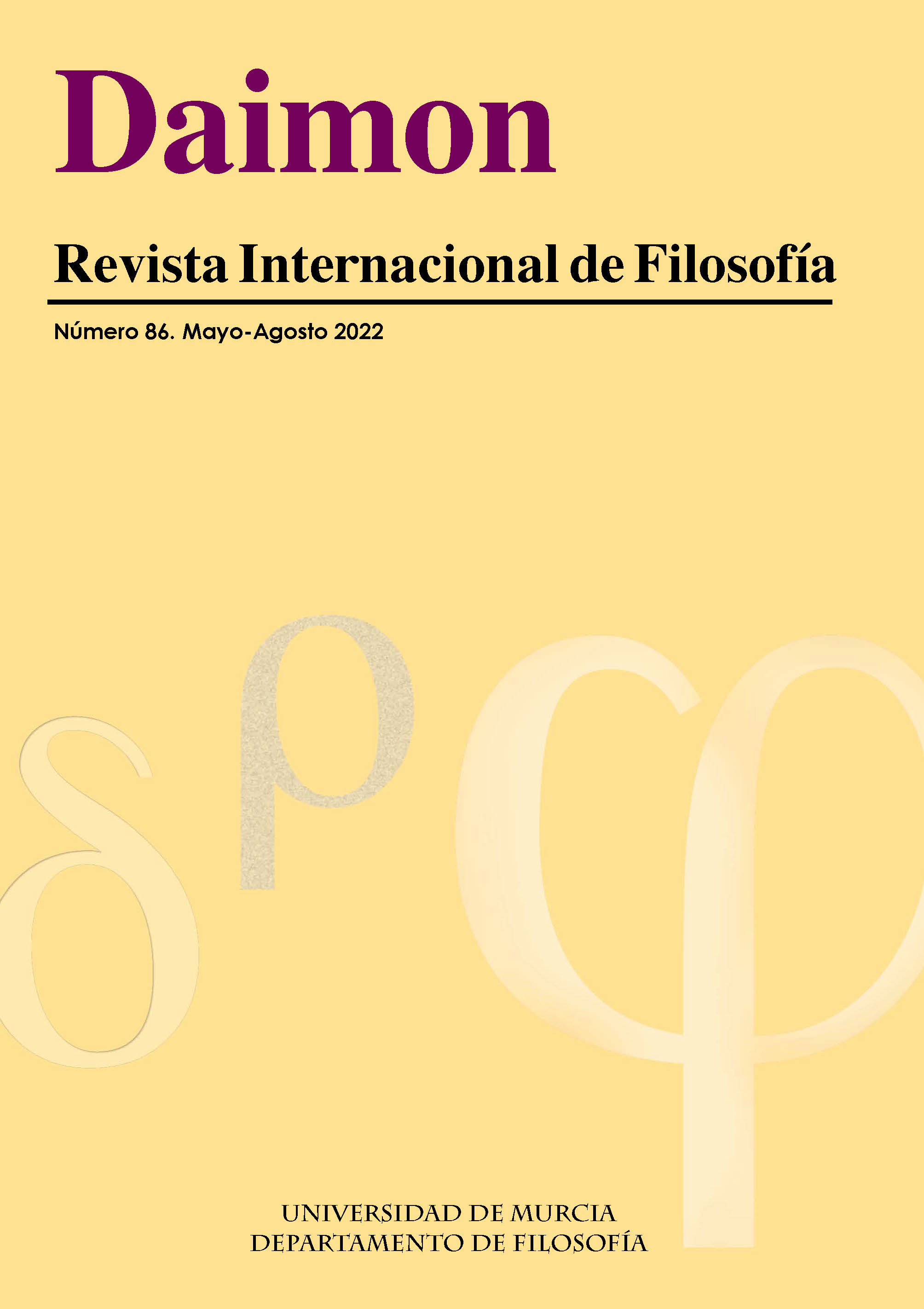Spinoza's Ethics as an onto-gnoseological project
Abstract
The following paper is an attempt to rethink the way in which the first part of Baruch Spinoza's Ethics has been interpreted by tradition. Fundamentally, it seeks to move away from what we call “ontological” interpretations -which maintain that the conceptual distinctions postulated refer to different areas of the real- and posits a reading utilizing the gnoseological factor to explain the principle of such distinctions. An attempt will be made to show that through this interpretation one gains access to what seems to be the most authentic Spinozist spirit: one where the multiplicity of the perspectives of human knowledge becomes coherent with the most absolute univocity of the real.
Downloads
-
Abstract1161
-
PDF (Español (España))785
-
HTML (Español (España))413
References
Fuente:
Spinoza, B. (1925) Opera, Gebhardt, Carl (ed.), Heidelberg, Akademie der Wissenschaften.
Traducciones:
Spinoza, B. (2016) Ética, traducción de Vidal Peña, Madrid: Alianza.
Spinoza, B. (2007) Epistolario, traducción de Oscar Cohan, Buenos Aires: Colihue Clásica.
Spinoza, B. (2006) Tratado de la reforma del entendimiento, traducción de Oscar Cohan, Buenos Aires: Cactus.
Bibliografía:
Bayle, P. (2010) Diccionario histórico y crítico, compilado, traducido y dirigido por Fernando Bahr, Buenos Aires: El Cuenco de Plata.
Chaui, M. (1999) A Nervura do real. Imanência e liberdade em Espinosa, São Paulo: Companhia das Letras.
De Dijn, H. (1991) “Metaphysics as Ethics” en: Yovel, Y. (ed): God and Nature: Spinoza´s Metaphysics: Papers Presented at the First Jerusalem Conference, Leiden: E. J. Brill, pp. 119-133.
Deleuze, G. (1996) Spinoza y el problema de la expresión, trad. Horst Vogel, Barcelona: Muchnik editores S. A.
Hegel, G. W. F. (1955) Lecciones sobre la Historia de la Filosofía, Colección de textos clásicos: Grandes obras, Tomo I, dirigida por José Gaos, México-Buenos Aires: Fondo de Cultura Económica.
Henry, M. (2008) La felicidad de Spinoza, Buenos Aires: La Cebra.
Jarrett, C. (2001) “Spinoza´'s distinction between essence and existence”, Iyyun. The Jerusalem Philosophical Quarterly 50, Julio 2001, pp. 245-252.
Klein, J. (2002) “'By Eternity I Understand': Eternity According to Spinoza”, lyyun. The Jerusalem Philosophical Quarterly 51, Julio 2002, pp. 295-324.
Martin, C. P. (2008) “The Framework of Essences in Spinoza's Ethics”, British Journal for the History of Philosophy, 16:3, pp. 489-50.
Morfino, V. (2015) “Esencia y Relación”, Revista Pensamiento Político, Num. 6, pp. 1-26.
Negri, A. (1993) La anomalía salvaje. Ensayo sobre poder y potencia en Baruch Spinoza, Barcelona: Anthropos.
Sabater, N. (2019) La destinación humana en Spinoza: una interpretación de su proyecto ético, Buenos Aires: RAGIF Ediciones.
Schmaltz, T. (2015) “Spinoza on Eternity and Duration: The 1663 Connection”, en: Melamed, Y. (ed.), The Young Spinoza. A Metaphysician in the Making, Oxford: Oxford University Press, pp. 205-220.
Solé, M. J. (2013) “La intuición intelectual en Spinoza” en: Tatián, D. (comp.): Spinoza. Noveno Coloquio, Córdoba: Editorial Brujas, pp. 205-217.
Steinberg, D. (2009) “Knowledge in Spinoza's Ethics” en: Koistinen, O. (ed.): The Cambridge Companion to Spinoza’s Ethics, Cambridge University Press, pp. 140-167.
Viljanen, V. (2011) Spinoza´s Geometry of Power, New York: Cambridge University Press.
Zambrano, M. (1936) “La salvación del individuo en Spinoza”, Cuadernos de la Facultad de Filosofía y Letras N°3, Universidad Complutense, Madrid, pp. 7-20.
Copyright (c) 2022 Daimon Revista Internacional de Filosofia

This work is licensed under a Creative Commons Attribution-NonCommercial-NoDerivatives 3.0 Unported License.
Las obras que se publican en esta revista están sujetas a los siguientes términos:
1. El Servicio de Publicaciones de la Universidad de Murcia (la editorial) conserva los derechos patrimoniales (copyright) de las obras publicadas, y favorece y permite la reutilización de las mismas bajo la licencia de uso indicada en el punto 2.
2. Las obras se publican en la edición electrónica de la revista bajo una licencia Creative Commons Reconocimiento-NoComercial-SinObraDerivada 3.0 España (texto legal). Se pueden copiar, usar, difundir, transmitir y exponer públicamente, siempre que: i) se cite la autoría y la fuente original de su publicación (revista, editorial y URL de la obra); ii) no se usen para fines comerciales; iii) si remezcla, transforma o crea a partir del material, no podrá distribuir el material modificado.
3. Condiciones de auto-archivo. Se permite y se anima a los autores a difundir electrónicamente las versiones pre-print (versión antes de ser evaluada) y/o post-print (versión evaluada y aceptada para su publicación) de sus obras antes de su publicación, ya que favorece su circulación y difusión más temprana y con ello un posible aumento en su citación y alcance entre la comunidad académica. Color RoMEO: verde.











